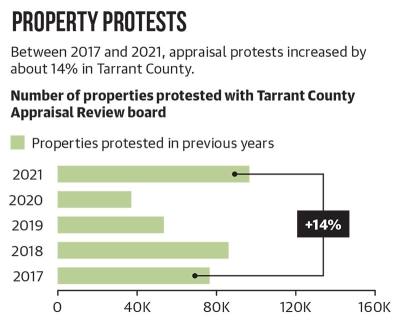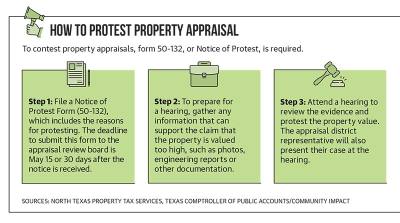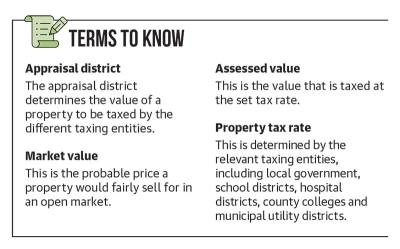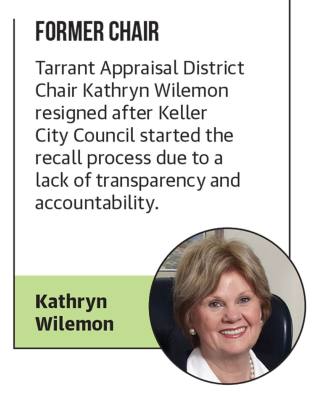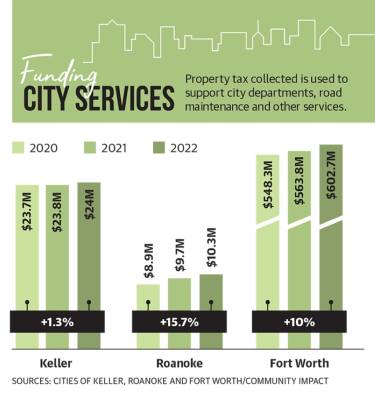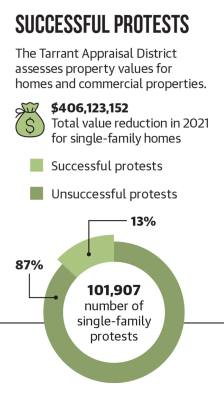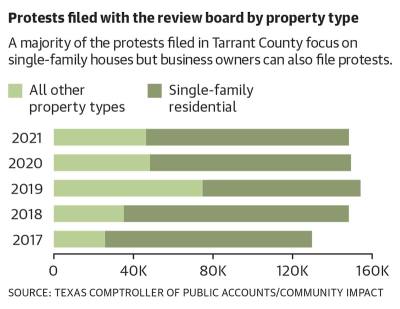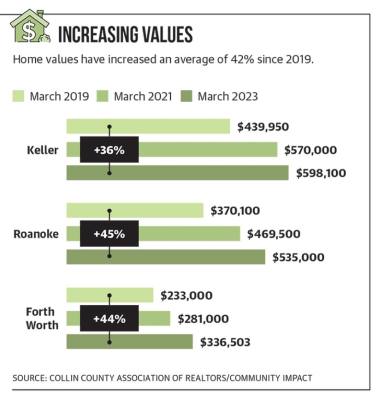The board members lead the Tarrant Appraisal District, the entity that appraises the value of homes and other properties in the county as well as administers property tax exemptions. The district is responsible for local property tax appraisals and exemptions in Tarrant County. The district does not directly tax residents, but determines the value of a resident’s property.
Council and local Realtor Chandler Crouch raised concerns over a lack of transparency and complaints about property tax estimates. When county residents showed up for a special June 30 meeting of the appraisal board last year, they had been locked out.
During a March 17 meeting, Chief Appraiser Jeff Law apologized for the decisions made in leaving people to stand outside the previous June. He said the board does not have a set meeting space, and the multipurpose room it usually uses was not available. He said the board was meeting in a smaller space that did not have the capacity for a large crowd of community members.
“I regret that people wound up being outside in the heat,” Law said. “If [I] had the ability to rewind, and go back and redo things, [then] those folks should have been allowed in the lobby.”
Following this incident, attention stayed on the Tarrant Appraisal District when the Keller City Council unanimously voted to recall Wilemon on Feb. 21.
Keller Mayor Armin Mizani issued a letter on Feb. 22 and said the council voted for Wilemon in 2021 to see “increased accountability and transparency” within the board. He said many constituents do not have trust in the appeal process and the accountability and transparency is not there two years later, thus the recall.•
Appraisal district board members are elected by taxing entities, such as cities and school districts. Keller City Council was one of eight taxing entities that voted to install Wilemon as chair for the fiscal year 2022-23 term. Other entities included Tarrant County and Tarrant County College.
Entities can vote to begin a recall process of a board member, but only if they initially voted for the member.
“In Keller, we’re unapologetic about protecting our taxpayers,” Mizani said in the Feb. 21 meeting. “Not only did we pledge to reduce the tax burden, but also we made a pledge to increase accountability and transparency.”
Objectives set
In the midst of the district’s changes, the board decided in an April 10 meeting that Law would be given 90 days to address the transparency and communication problems circulating around the board with 11 specific issues written out in a Letter of Repair.
The letter highlighted the district’s 100% audit score from the Texas State Comptroller but described numerous incidents that “adversely affected the credibility” and “loss of confidence” of the district. The letter addressed to Law was shared by the Tarrant Appraisal District staff.
The first of the 11 items listed is for Law to implement a plan to repair the credibility and reputation of the Tarrant Appraisal District. Others noted improving communication; revising the conflict of interest policy; responding to citizens, media and stakeholders’ inquiries in a timely manner; and advising local legislative members of potential conflicts in replacing a chair.
Failure to resolve the issues could result in further corrective action, up to and including dismissal, according to the letter.
“This board is interested in doing the right thing here with this letter of repair,” Board Secretary Rich DeOtte said during the April 10 meeting. “I think it communicates the seriousness the board feels about what happened the last year and a half, and certainly the last nine months, should have never happened. There are certain things that need to be fixed, and not addressing them is not acceptable.”
When speaking about recalling Wilemon, Mizani cited a few issues the board had not handled well recently, such as a surge in appraisal protests and a controversy involving a complaint filed against Crouch, who helped taxpayers protest their property values. Filed by the board’s Director of Residential Appraisals Randy Armstrong, Crouch was accused of the “misrepresentation of facts and abuse of his dual positions as both a property tax consultant and licensed Texas Realtor,” according to the filed complaint.
The letter of repair stated those complaints were filed using resources belonging to the Tarrant Appraisal District.
In August 2022, the Texas Department of Licensing and Regulation’s investigation found no evidence of Crouch committing a violation. Armstrong and Law were suspended by the board for two weeks without pay in August for their handling of the dispute. The “failure of management” was listed in the letter to Law, who said he was unaware of the complaints.
“When we hear stories of a former TAD employee harassing female employees; when we hear stories of a high-ranking TAD employee targeting the livelihood and professional license of someone solely on the basis that they were assisting others with their protests, that creates serious distrust,” Mizani said.
Taking the next steps
When Keller City Council began the recall process, Wilemon issued her resignation from the Tarrant Appraisal District board. Initially the board accepted that resignation, but rescinded that acceptance during a March 17 special board meeting.
Under Chapter 6 of the Texas State Property Tax Code, two paths for filling a vacancy left by the director of the board are designated. Per the code, since the recall process was completed, the taxing entities that voted during that process will nominate and vote on a list of candidates to determine the director’s replacement.
On March 7, Tarrant County Commissioners Court voted to recall Wilemon from her position, joining Keller City Council in this action. Tarrant County Judge Tim O’Hare said in a statement Wilemon’s successor should be chosen by elected representatives, not members of the appraisal district board.
“The only way to begin to restore the public’s trust in [the appraisal district] is to first ensure the taxpayers have as much influence as possible in this critical decision,” he said. “This wasn’t personal. From what I’m concerned, she is a nice lady. I wanted to preserve Tarrant County to pick the board member. I placed it on the agenda, let’s get the recall and give us the ability to pick the replacement on the board.”
During the March 17 meeting, DeOtte said he will be acting chair, which is in accordance with the tax code.
Protesting appraisals
While each taxing authority sets its property tax rate, the Tarrant Appraisal District determines property appraisals. Taxing units then allocate the tax burden.
The district also determines the eligibility of various types of property tax exemptions, such as homestead exemptions for the elderly, disabled persons, and charitable or religious organizations.
Residents can protest their property tax appraisals if the valuation is deemed too high or if the appraisal records are incorrect.
Homeowners received notice of their property values in April. The deadline for protesting the value was May 15 or 30 days after it is received. The district reviews protests through the appraisal review board or informal hearings. A change last last month moved the new date to May 30 after a series of complaints with the district's website function.
Crouch said the Tarrant Appraisal District has to do better going forward with the changes.
“I hope that [the Tarrant Appraisal District] and the [district’s] board will approach problems proactively, showing sincere empathy for the impact of government on its citizens,” Crouch said.
Colby Farr and Cody Thorn contributed to this report.
Editor note: An attribution to a quote was incorrect and has been corrected.






